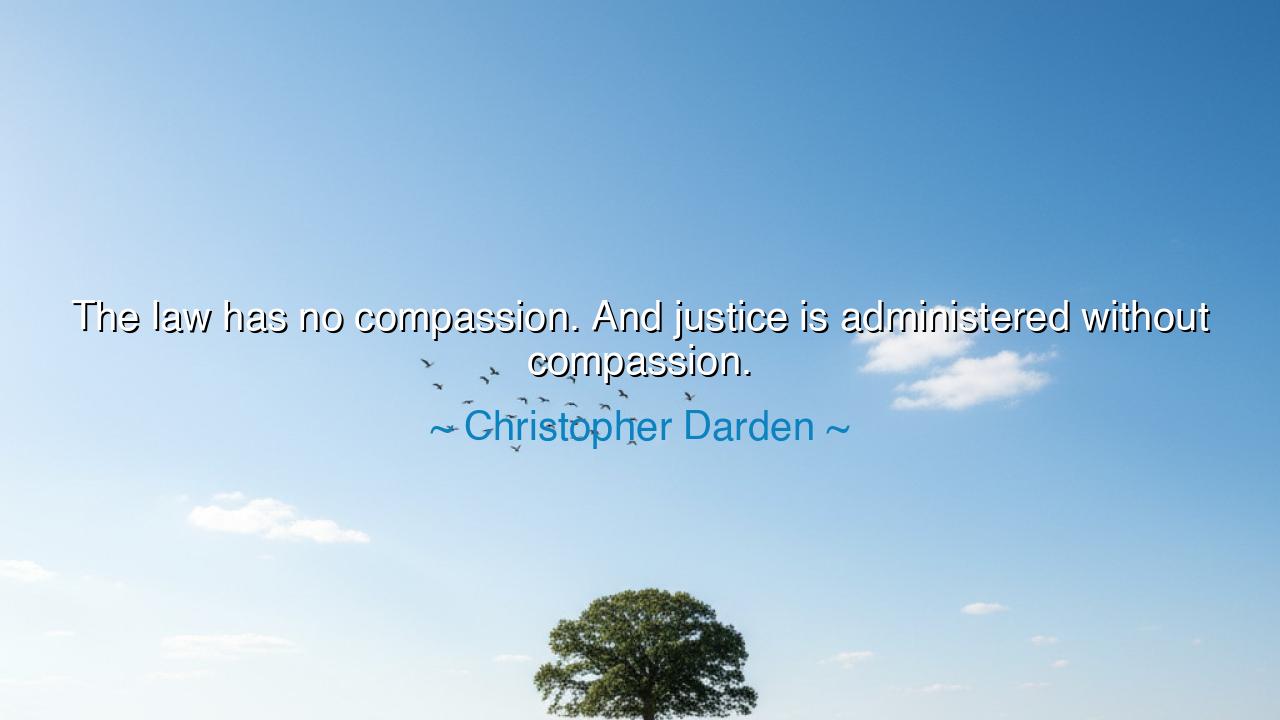
The law has no compassion. And justice is administered without






The words of Christopher Darden, “The law has no compassion. And justice is administered without compassion,” resound like a tolling bell, somber and unyielding. They remind us that the instruments of human society, designed to preserve order and punish wrongdoing, are not tender hearts but cold mechanisms. The law, in its essence, does not bend to pity or mercy; it moves according to statutes, precedents, and rigid codes. And even justice, the lofty aim of law, is not delivered with warmth, but with the sharp edge of impartiality. Darden, who walked the stormy path of one of the most infamous trials of the modern age, spoke these words with the clarity of one who has seen firsthand how the courtroom strips away sentiment to reach its conclusions.
The origin of this quote lies in Darden’s reflections as a prosecutor during the O. J. Simpson trial, a case that gripped the world and exposed the deep tensions between law, race, media, and public opinion. In the heat of such a trial, the eyes of millions turned not toward compassion but toward judgment. Darden, standing within that crucible, recognized a painful truth: courts do not exist to soothe the heart, but to weigh evidence, apply rules, and declare verdicts. What may seem merciless to some is, to the law, necessity. His words are not praise, but lamentation—the acknowledgment that when humanity longs for compassion, the law remains cold.
History itself reveals this harsh truth. Consider the trial of Joan of Arc in 1431. This young peasant girl, claiming divine visions, led France to victories against England. Yet when captured, she was dragged before a court of men who judged her not with compassion, but according to their interpretation of ecclesiastical law. No sympathy was granted for her courage or her youth. She was condemned and burned. The law, in that moment, had no compassion; justice, as administered by her captors, was bereft of mercy. Centuries later, she was declared innocent and canonized as a saint. But in her lifetime, she bore the cruel truth of Darden’s words.
The deeper meaning of this quote lies in the distinction between justice and mercy. Justice demands balance, retribution, and order; mercy demands tenderness, understanding, and forgiveness. The courtroom is built for the former, not the latter. When laws are written, they are carved in stone, not in flesh. They cannot adapt to the beating pulse of human suffering in every case. Compassion belongs to the hearts of individuals, to acts of pardon, to the spaces outside the rigid chambers of the court. Darden’s words remind us that to confuse justice with compassion is to misunderstand both.
Yet there is also wisdom in this coldness. For if law were governed by compassion alone, it would be swayed by emotion, unequal in its rulings, partial to the powerful or the pitiable. The harsh neutrality of law is what gives it stability, preventing chaos. But the danger lies in forgetting that behind every statute stands a human life, behind every verdict a soul. Darden’s lament warns us that while the law may not have compassion, society must not lose it altogether. For if compassion is absent both within and outside the courtroom, humanity will sink into cruelty.
The lesson for us is clear: when we seek justice in the courts, let us temper our expectations. Do not look for tenderness where none can be found. Instead, work to ensure that laws themselves are just, humane, and balanced, so that when they are applied without compassion, they do not produce cruelty. And outside the walls of the courts, let each of us embody compassion in our dealings, in our forgiveness, in our care for the weak. For though the law has no compassion, the people who create, reform, and live under it must.
Therefore, let us live as both guardians of justice and bearers of mercy. Let us respect the impartiality of law, but never allow our society to become as cold as its statutes. Let us reform laws when they wound the innocent, and let us never forget the power of compassion in the realms where law does not reach. For in this union—law to maintain order, compassion to preserve humanity—civilization endures.
So let Darden’s words echo as a grave and enduring truth: “The law has no compassion. And justice is administered without compassion.” It is a warning against misplaced hope, but also a call to action: that we must bring compassion to the places where law cannot, lest we live in a world ruled only by cold judgment and not by the warmth of the human spirit.






AAdministratorAdministrator
Welcome, honored guests. Please leave a comment, we will respond soon